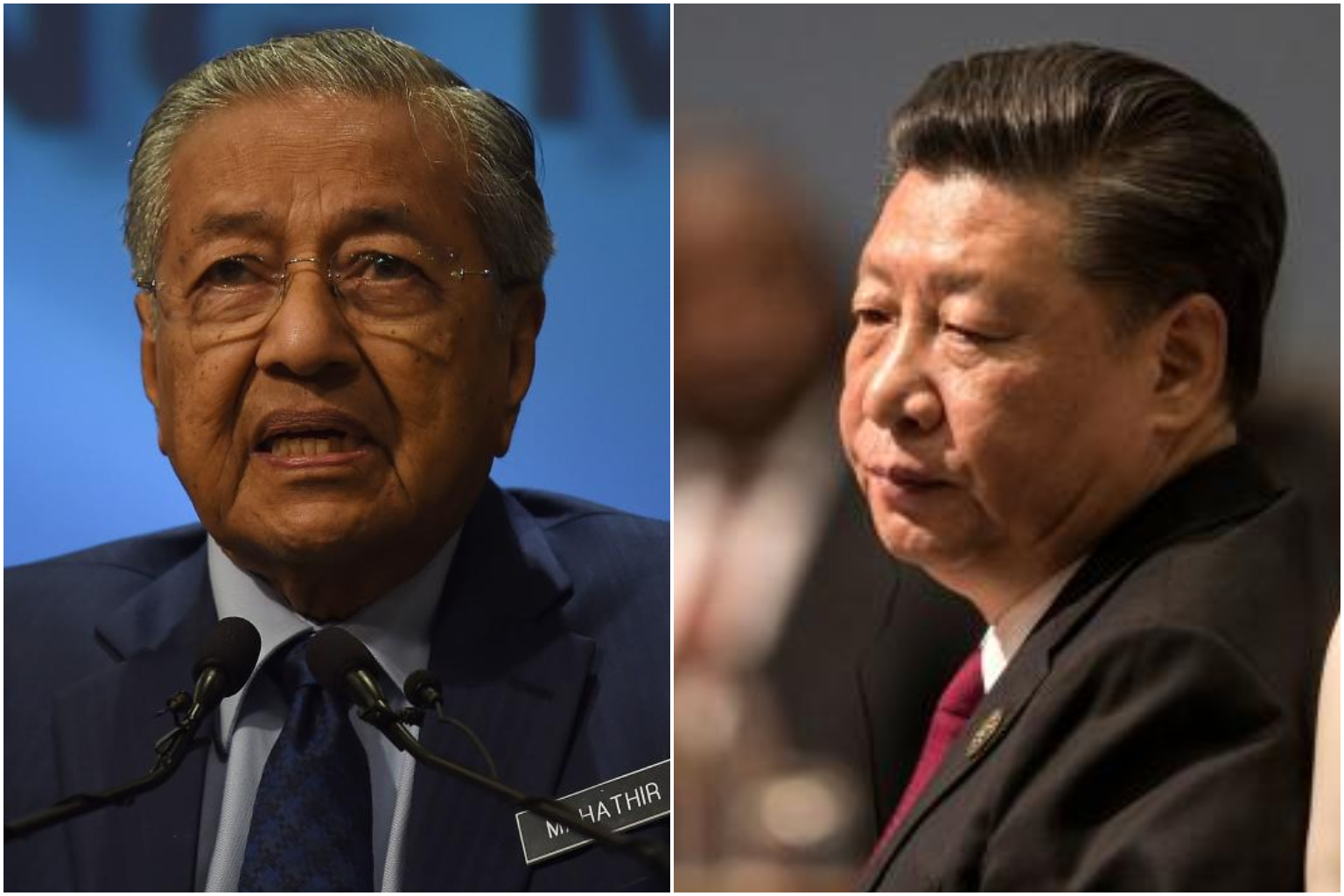Mahathir to meet China's top leaders on visit to 'recalibrate' bilateral ties, review mega projects
Sign up now: Get insights on Asia's fast-moving developments

Malaysian Prime Minister Mahathir Mohamad (left) is set to meet top Chinese leaders, including President Xi Jinping, when he arrives in China.
PHOTOS: AFP
BEIJING/KUALA LUMPUR - Malaysian Prime Minister Mahathir Mohamad will arrive in China on Friday (Aug 17), his first visit back to the country as premier after 17 years.
During his five-day visit, he will meet top Chinese leaders, including President Xi Jinping and Premier Li Keqiang, as well as business honchos in Hangzhou and Beijing.
The 93-year-old has a packed itinerary ahead of him. Among other things, he is scheduled to visit the headquarters of tech giant Alibaba and automaker Geely in Hangzhou before travelling to Beijing for meetings with Chinese leaders.
The visit has been billed by both Malaysia and China as a chance to reset and recalibrate their bilateral relationship under Tun Dr Mahathir's Pakatan Harapan (PH) government, which took power in May.
In an interview with the official Xinhua news agency published on Thursday, Dr Mahathir said relations with China were very important and his new government wanted "close relations" with its bigger neighbour.
He also said his views on China remained unchanged from his first stint as prime minister from 1981 to 2003 and that he believed both countries would solve their differences amicably.
The Malaysian Foreign Ministry, in a statement on Thursday (Aug 16), called the visit "a new milestone in the consolidation of bilateral ties", and said it would set new strategic pillars to invigorate future bilateral cooperation.
China's Ambassador to Malaysia Bai Tian, in a commentary published in the official People's Daily on Wednesday (Aug 15), said that bilateral ties stood at a "new historical starting point".
Before the PH coalition ousted the Umno-led Barisan Nasional from power, it had accused the then ruling party of selling out national interests in its dealings with both China's government and its corporate sector.
Friday's visit - Dr Mahathir's longest trip overseas since he became premier a second time - is indicative of both China's primacy in Malaysia's foreign policy and the importance that Kuala Lumpur is attaching to the breadth and sensitivity of this "reset" in ties, said experts.
Dr Mahathir had, ahead of his own visit, sent emissaries to engage China, seen as a bid to reassure Beijing. In May, he sent businessman Robert Kuok, one of his key advisers, to meet the Chinese ambassador in Kuala Lumpur to discuss continued cooperation.
Last month, his trusted lieutenant Daim Zainuddin, who heads the government's advisory council, visited Beijing to begin negotiations on unwinding two billion-dollar deals signed by the former Najib Razak administration, and was accorded treatment usually reserved for top state leaders.
The US$20 billion (S$27.5 billion) East Coast Rail Link (ECRL) and a contract to build two gas pipelines worth US$2.3 billion have made headlines after Kuala Lumpur questioned the price tags and the fact that payment has been made for work that has not been completed.
These projects, which have since been suspended, will be on the agenda, although Dr Mahathir has hinted at flexibility.
"We don't think we need those two projects. We don't think they are viable. If we can, we would like to just drop the projects but if that cannot be done we will have to postpone it to the future where maybe the need will arise," he told Associated Press in an interview this week.
The ECRL is part of China's ambitious Belt and Road Initiative (BRI) and Beijing is unlikely to agree to its cancellation.
In the Xinhua interview, Dr Mahathir said his government welcomed foreign investment, especially those that bring in capital, technologies and employment opportunities for Malaysians.
ISEAS - Yusof Ishak Institute senior fellow Lye Liang Fook said Dr Mahathir will likely ask for a review of the Chinese projects - either for costs to be trimmed or their scale reduced.
Such an outcome would allow Dr Mahathir to say that he has improved governance or oversight of these mega projects, Mr Lye said.
"At the end of the day Mahathir is not embarking on an anti-Chinese crusade. It does not serve his objectives to improve local governance and boost the local economy," he added.
Dr Rais Hussin, chief strategist for Parti Pribumi Bersatu Malaysia, Dr Mahathir's party, said the government is against corruption and not China.
"There are no Cabinet ministers in Malaysia who, to date, oppose the BRI... They just want it to be more accountable and transparent to prevent any insidious corruption," he said.
But Associate Professor Li Mingjiang of the S. Rajaratnam School of International Studies cautioned that it was not likely that China would make immediate concessions to Malaysia.
"It would set a bad precedent - that if there are problems with BRI projects, countries can just take a step back and renegotiate," he said.
Apart from his wife, Dr Mahathir will be accompanied by his ministers, including those in charge of agriculture, primary industries, trade, and entrepreneurship, signalling that furthering business ties and crucial exports of cash crops would also be high on the agenda.


